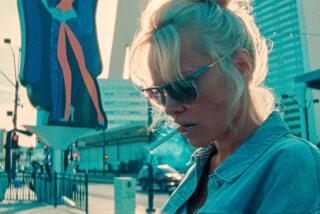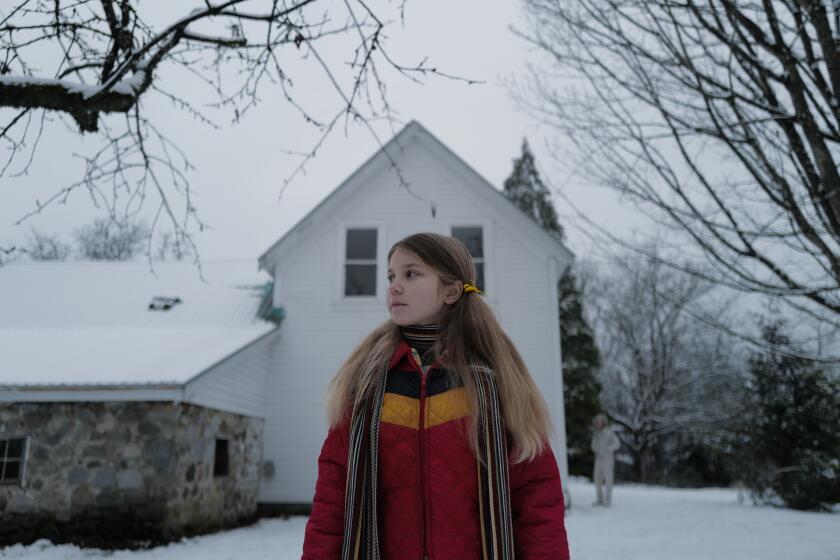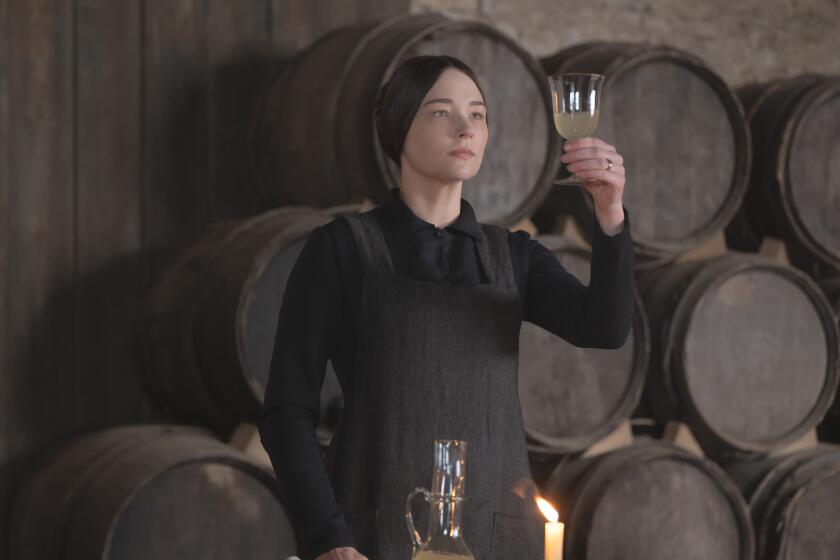Hanks’ Road Less Traveled
Half a century ago, James Stewart, at that point the most beloved of American leading men, decided it was time for something completely different.
In a series of bitter, disturbing, early-1950s westerns directed by Anthony Mann--”Winchester ‘73,” “The Naked Spur” and “The Man From Laramie”--Stewart began playing ruthless loners bent on revenge, men capable of rages so terrifying that to experience them is to forget that the sentimental Stewart of “Mr. Smith Goes to Washington” and “It’s a Wonderful Life” ever existed.
Stewart’s chilling about-face inevitably comes to mind when watching his modern equivalent, Tom Hanks, identically turn himself inside-out (or is it outside-in?) in director Sam Mendes’ brooding, powerful, exquisitely made “Road to Perdition,” playing a Depression-era gangland executioner so skilled and implacable he’s known as the Angel of Death.
Hanks’ Michael Sullivan is a man of few words and less inflection, capable of freezing his rivals with hard looks from impenetrable eyes as well as disconcerting his two young sons with the weight and solemnity of his presence.
It is a lean and deadly performance, one of Hanks’ best, and because it is free of mannerisms and has the feeling of coming from an unexpectedly dark and deep place, it makes Sullivan’s savage pursuit of a bloody revenge particularly scary and convincing.
It is also unnerving because Hanks remains Hanks, a person we instinctively connect with no matter how bloody his trade.
And so, although his milieu is a violent one, Sullivan’s story is finally an emotional and personal one.
It’s the story of the unavoidably difficult relationship between fathers and sons, both biological and surrogate, a touchy connection a character sums up by insisting, “It’s a natural law: Sons are put on this earth to trouble their fathers.”
Mendes, in only his second feature (following the Oscar-winning “American Beauty”), has told this surprisingly resonant story with the potent, unrelenting fatalism of a previously unknown Greek myth.
This is classic albeit somber filmmaking, restrained and all of a piece, by a director who believes film can tell adult stories in an adult manner, who knows the effects he wants and how to get them.
“Road to Perdition” started life as a 1998 graphic novel by Max Allan Collins with art by Richard Piers Rayner.
David Self, who previously wrote the focused “Thirteen Days” and the out-of-control “The Haunting,” has made some very shrewd changes to the original that increase its emotional wattage. Sullivan has a closer relationship with the crime boss he now considers his surrogate father as well as a more unresolved, unsettled one with his 12-year-old son.
“Road to Perdition” opens with a spare voice-over, spoken by that son as a grown man, that establishes an unwavering tone and sets up the plot: “There are many stories about Michael Sullivan. Some say he was a decent man. Some say there was no good in him at all. But I once spent six weeks with him in the winter of 1931. This is our story.”
As is fitting for a violent story, “Perdition” opens with a wake in one of the biggest houses in Rock Island, Ill. It belongs to John Rooney (a faultless Paul Newman), who, at first glance, comes off as a garrulous community leader or maybe the indulgent grandfather to Sullivan’s two boys, the older Michael Jr. (Tyler Hoechlin) and the younger Peter (Liam Aiken).
But in truth, Rooney is a major underworld kingpin, a close associate of Al Capone, someone of whom it is truthfully, and fearfully, said, “You rule this town as God rules the Earth. You give and you take away.”
Sullivan is more than the top lieutenant who enforces the boss’ edicts in blood; he has been like a son to Rooney ever since he was a young orphan taken under the powerful man’s wing.
This closeness is beautifully and wordlessly conveyed in a scene at the wake when the two men casually collaborate on a quiet piano duet. It’s a lovely thing to everyone but Rooney’s natural son Connor (British actor Daniel Craig, a long way from “Lara Croft: Tomb Raider”), the classic Sonny Cor- leone-type hothead whose appetite for blood is more apparent than his sanity.
Sullivan’s two boys idolize him, although they’re not really sure what he does. They hope he’s a secret agent, someone who goes on missions like their hero, the Lone Ranger.
One night, Michael Jr. tags along hidden in a car and, in a vision of almost primal intensity, sees his father take part in a savage bloodbath. It’s a moment that not only changes their relationship, but that also leads inexorably to the cold-blooded murder of the boy’s younger brother and his mother (Jennifer Jason Leigh).
Sullivan is a man built for revenge, but he hadn’t counted on having his son with him as he sets out on what is, of course, a drenched-in-violence journey to get it. Sullivan needs to find a way to smoke out his family’s killer, to stay one step ahead of Maguire (Jude Law), the eccentric assassin sent after him and to improve a relationship with his surviving son--whom he’d like to deposit with relatives in a town called Perdition--that is freighted with all kinds of complications neither feels equipped to handle.
“Road to Perdition’s” excellent cast sees to it that all the ramifications of this story play out as they’re supposed to. Newman, who gets nothing but better with age, is riveting as a cold-blooded man of business weighing his legacy against his feelings for a surrogate son. Law brings the right amount of strangeness to a killer whose main drive is to photograph his victims and Stanley Tucci has an effective cameo as Capone cohort Frank Nitti. And Hoechlin, one of more than 2,000 who tried out for the part of young Sullivan, effectively creates a character who gets under his father’s skin.
For people who make studio films, opportunities to work on serious projects with sizable budgets are rare, and “Road to Perdition” has obtained the services of what is, in effect, an all-star team of behind-the-camera personnel, starting with graceful cinematographer Conrad L. Hall.
A two-time Oscar winner (including one for “American Beauty”) and a nine-time nominee, Hall has crafted, without seeming to try too hard, a series of beautifully bleak, unforgiving Midwest-in-winter vistas that use the dark colors of nightmare to recall the loneliness of Edward Hopper canvases.
Re-creating the meticulous sense of 1930s atmosphere that Richard Piers Rayner brought to the graphic novel are production designer Dennis Gassner and costume designer Albert Wolsky, a two-time Oscar winner, for “All That Jazz” and “Bugsy.”
The evocative score is by Thomas Newman and giving the film its stately pace is editor Jill Bilcock, who last did Baz Luhrmann’s very different “Moulin Rouge.”
“Road to Perdition” has worried a great deal about the details, to the point of having fabric specially woven, aged and dyed so costumes had the proper weight for the period, but that doesn’t mean emotion has been neglected. Because it is so careful with its effects, this film’s ability to create feeling sneaks up and surprises.
This is a story with a will to move us and the ability to do whatever it takes to make that happen.
MPAA rating: R, for violence and language. Times guidelines: The violence, both real and suggested, is truly frightening, especially when it’s directed at children.
‘Road to Perdition’
Tom Hanks...Michael Sullivan
Paul Newman...John Rooney
Jude Law...Maguire
Jennifer Jason Leigh...Annie Sullivan
Stanley Tucci...Frank Nitti
Daniel Craig...Connor Rooney
Tyler Hoechlin...Michael Sullivan Jr.
Liam Aiken...Peter Sullivan
DreamWorks Pictures and 20th Century Fox present a Zanuck Co. production, released by DreamWorks. Director Sam Mendes. Producers Richard D. Zanuck, Dean Zanuck, Sam Mendes. Executive producers Walter F. Parkes, Joan Bradshaw. Screenplay David Self, based on the graphic novel written by Max Allan Collins and illustrated by Richard Piers Rayner. Cinematographer Conrad L. Hall. Editor Jill Bilcock. Costumes Albert Wolsky. Music Thomas Newman. Production design Dennis Gassner. Art director Richard L. Johnson. Set decorator Nancy Haigh. Running time: 1 hour, 59 minutes.
In general release.
More to Read
Only good movies
Get the Indie Focus newsletter, Mark Olsen's weekly guide to the world of cinema.
You may occasionally receive promotional content from the Los Angeles Times.







